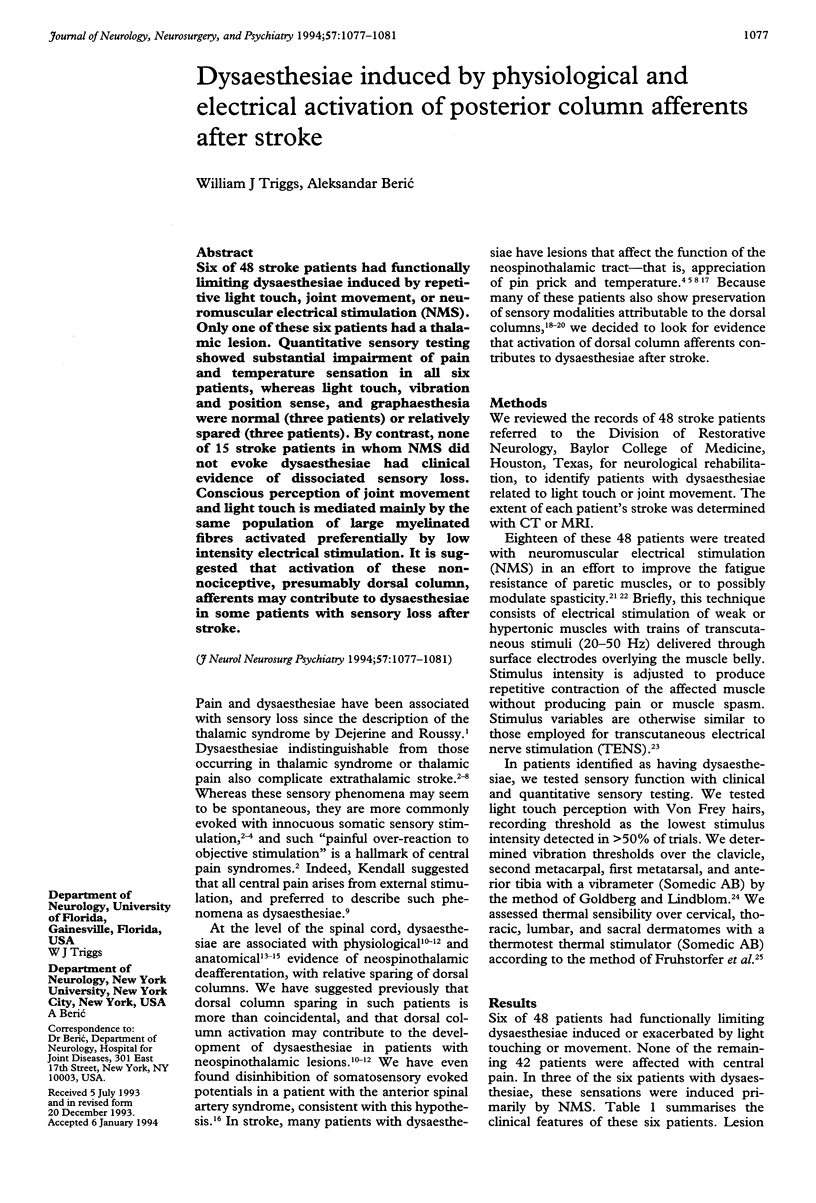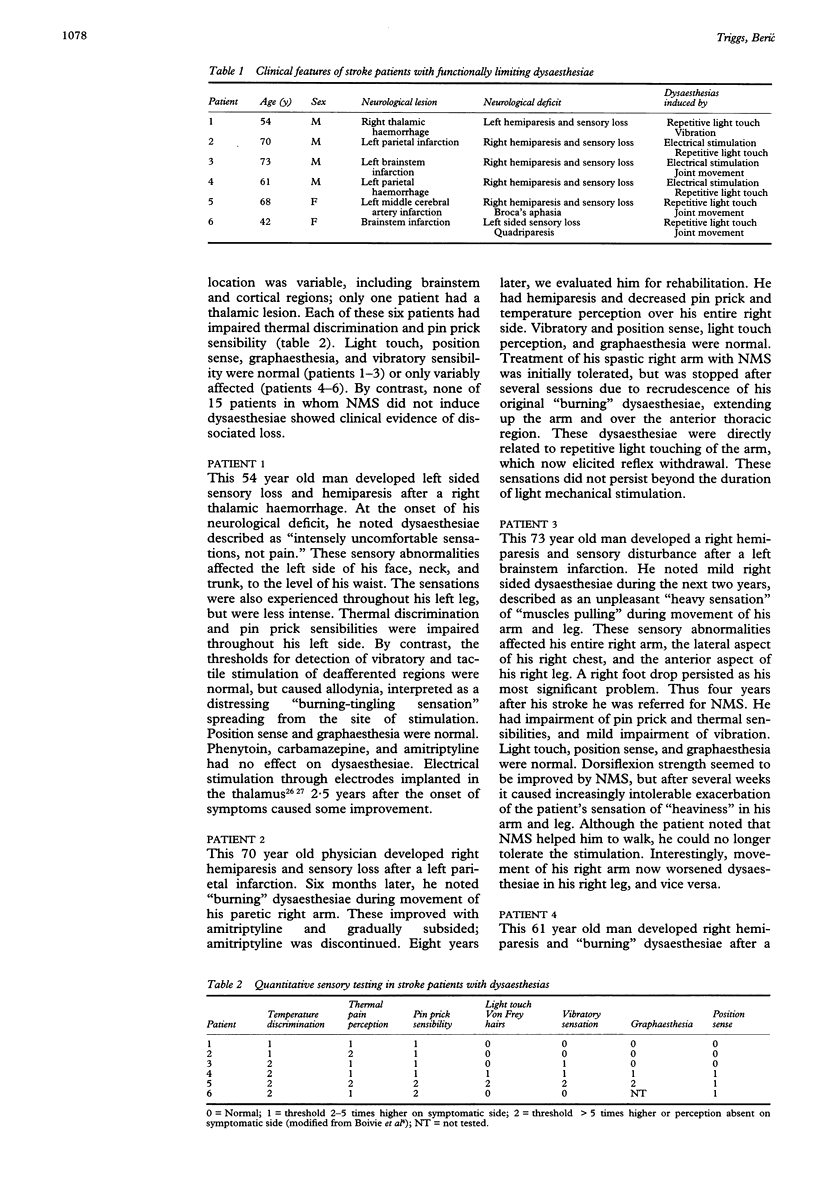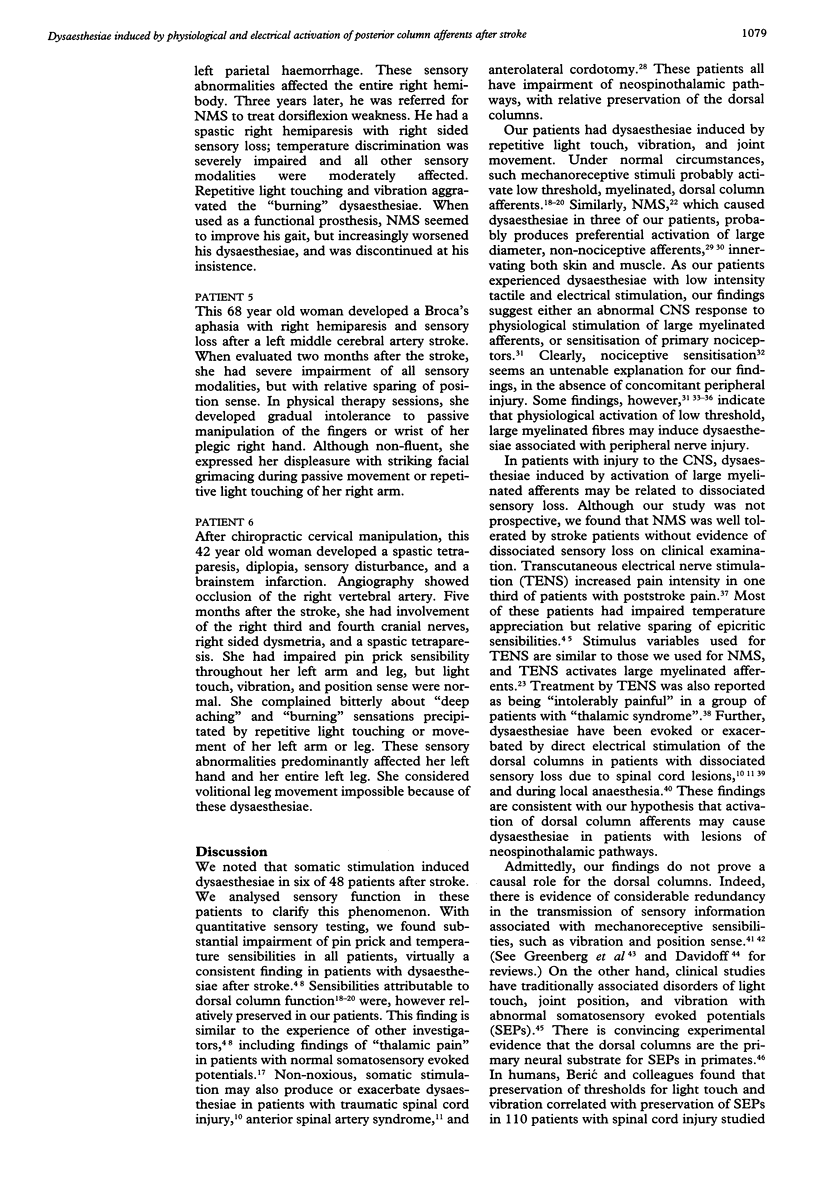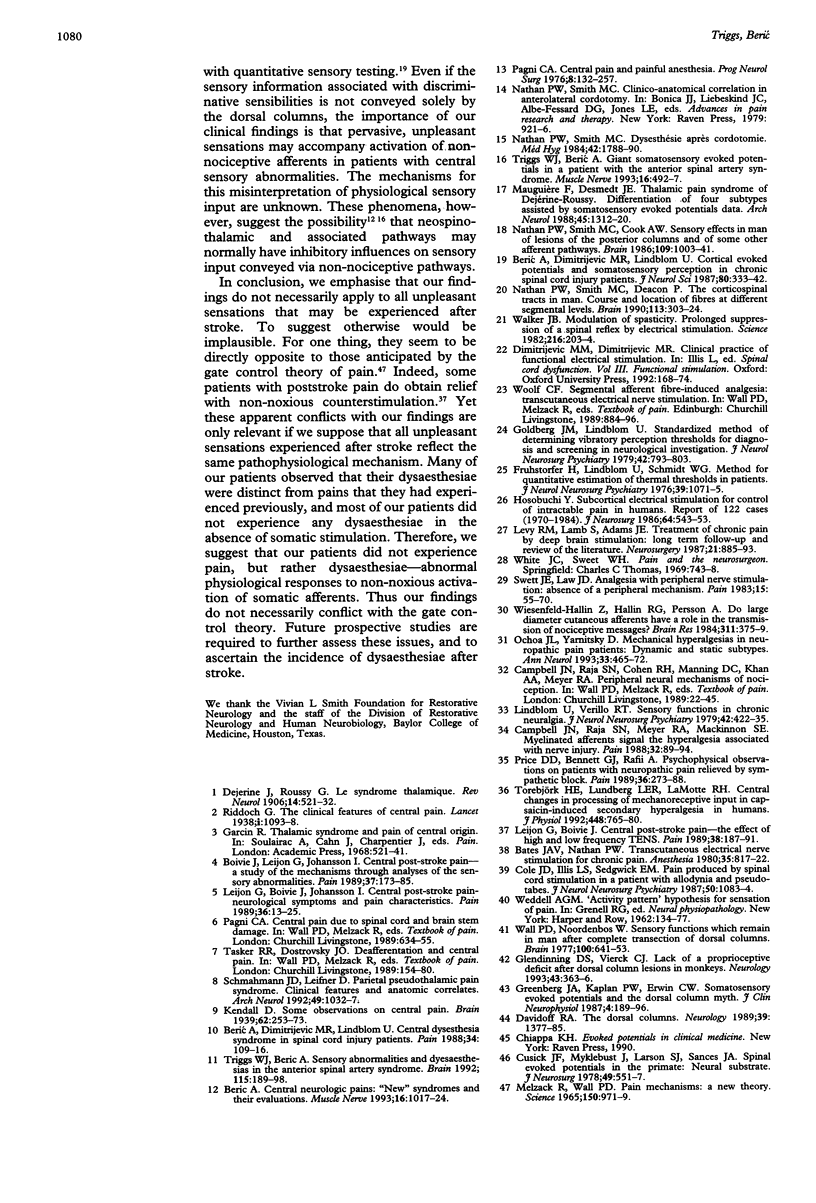Abstract
Six of 48 stroke patients had functionally limiting dysaesthesiae induced by repetitive light touch, joint movement, or neuromuscular electrical stimulation (NMS). Only one of these six patients had a thalamic lesion. Quantitative sensory testing showed substantial impairment of pain and temperature sensation in all six patients, whereas light touch, vibration and position sense, and graphaesthesia were normal (three patients) or relatively spared (three patients). By contrast, none of 15 stroke patients in whom NMS did not evoke dysaesthesiae had clinical evidence of dissociated sensory loss. Conscious perception of joint movement and light touch is mediated mainly by the same population of large myelinated fibres activated preferentially by low intensity electrical stimulation. It is suggested that activation of these non-nociceptive, presumably dorsal column, afferents may contribute to dysaesthesiae in some patients with sensory loss after stroke.
Full text
PDF



Selected References
These references are in PubMed. This may not be the complete list of references from this article.
- Bates J. A., Nathan P. W. Transcutaneous electrical nerve stimulation for chronic pain. Anaesthesia. 1980 Aug;35(8):817–822. doi: 10.1111/j.1365-2044.1980.tb03926.x. [DOI] [PubMed] [Google Scholar]
- Berić A. Central pain: "new" syndromes and their evaluation. Muscle Nerve. 1993 Oct;16(10):1017–1024. doi: 10.1002/mus.880161004. [DOI] [PubMed] [Google Scholar]
- Berić A., Dimitrijević M. R., Lindblom U. Central dysesthesia syndrome in spinal cord injury patients. Pain. 1988 Aug;34(2):109–116. doi: 10.1016/0304-3959(88)90155-8. [DOI] [PubMed] [Google Scholar]
- Berić A., Dimitrijević M. R., Lindblom U. Cortical evoked potentials and somatosensory perception in chronic spinal cord injury patients. J Neurol Sci. 1987 Sep;80(2-3):333–342. doi: 10.1016/0022-510x(87)90167-5. [DOI] [PubMed] [Google Scholar]
- Boivie J., Leijon G., Johansson I. Central post-stroke pain--a study of the mechanisms through analyses of the sensory abnormalities. Pain. 1989 May;37(2):173–185. doi: 10.1016/0304-3959(89)90128-0. [DOI] [PubMed] [Google Scholar]
- Campbell J. N., Raja S. N., Meyer R. A., Mackinnon S. E. Myelinated afferents signal the hyperalgesia associated with nerve injury. Pain. 1988 Jan;32(1):89–94. doi: 10.1016/0304-3959(88)90027-9. [DOI] [PubMed] [Google Scholar]
- Cole J. D., Illis L. S., Sedgwick E. M. Pain produced by spinal cord stimulation in a patient with allodynia and pseudo-tabes. J Neurol Neurosurg Psychiatry. 1987 Aug;50(8):1083–1084. doi: 10.1136/jnnp.50.8.1083. [DOI] [PMC free article] [PubMed] [Google Scholar]
- Cusick J. F., Myklebust J., Larson S. J., Sances A., Jr Spinal evoked potentials in the primate: neural substrate. J Neurosurg. 1978 Oct;49(4):551–557. doi: 10.3171/jns.1978.49.4.0551. [DOI] [PubMed] [Google Scholar]
- Davidoff R. A. The dorsal columns. Neurology. 1989 Oct;39(10):1377–1385. doi: 10.1212/wnl.39.10.1377. [DOI] [PubMed] [Google Scholar]
- Fruhstorfer H., Lindblom U., Schmidt W. C. Method for quantitative estimation of thermal thresholds in patients. J Neurol Neurosurg Psychiatry. 1976 Nov;39(11):1071–1075. doi: 10.1136/jnnp.39.11.1071. [DOI] [PMC free article] [PubMed] [Google Scholar]
- Glendinning D. S., Vierck C. J., Jr Lack of a proprioceptive deficit after dorsal column lesions in monkeys. Neurology. 1993 Feb;43(2):363–366. doi: 10.1212/wnl.43.2.363. [DOI] [PubMed] [Google Scholar]
- Goldberg J. M., Lindblom U. Standardised method of determining vibratory perception thresholds for diagnosis and screening in neurological investigation. J Neurol Neurosurg Psychiatry. 1979 Sep;42(9):793–803. doi: 10.1136/jnnp.42.9.793. [DOI] [PMC free article] [PubMed] [Google Scholar]
- Greenberg J. A., Kaplan P. W., Erwin C. W. Somatosensory evoked potentials and the dorsal column myth. J Clin Neurophysiol. 1987 Apr;4(2):189–196. doi: 10.1097/00004691-198704000-00006. [DOI] [PubMed] [Google Scholar]
- Hosobuchi Y. Subcortical electrical stimulation for control of intractable pain in humans. Report of 122 cases (1970-1984). J Neurosurg. 1986 Apr;64(4):543–553. doi: 10.3171/jns.1986.64.4.0543. [DOI] [PubMed] [Google Scholar]
- Leijon G., Boivie J. Central post-stroke pain--the effect of high and low frequency TENS. Pain. 1989 Aug;38(2):187–191. doi: 10.1016/0304-3959(89)90237-6. [DOI] [PubMed] [Google Scholar]
- Leijon G., Boivie J., Johansson I. Central post-stroke pain--neurological symptoms and pain characteristics. Pain. 1989 Jan;36(1):13–25. doi: 10.1016/0304-3959(89)90107-3. [DOI] [PubMed] [Google Scholar]
- Levy R. M., Lamb S., Adams J. E. Treatment of chronic pain by deep brain stimulation: long term follow-up and review of the literature. Neurosurgery. 1987 Dec;21(6):885–893. doi: 10.1227/00006123-198712000-00017. [DOI] [PubMed] [Google Scholar]
- Lindblom U., Verrillo R. T. Sensory functions in chronic neuralgia. J Neurol Neurosurg Psychiatry. 1979 May;42(5):422–435. doi: 10.1136/jnnp.42.5.422. [DOI] [PMC free article] [PubMed] [Google Scholar]
- Mauguière F., Desmedt J. E. Thalamic pain syndrome of Dejérine-Roussy. Differentiation of four subtypes assisted by somatosensory evoked potentials data. Arch Neurol. 1988 Dec;45(12):1312–1320. doi: 10.1001/archneur.1988.00520360030007. [DOI] [PubMed] [Google Scholar]
- Melzack R., Wall P. D. Pain mechanisms: a new theory. Science. 1965 Nov 19;150(3699):971–979. doi: 10.1126/science.150.3699.971. [DOI] [PubMed] [Google Scholar]
- Nathan P. W., Smith M. C., Cook A. W. Sensory effects in man of lesions of the posterior columns and of some other afferent pathways. Brain. 1986 Oct;109(Pt 5):1003–1041. doi: 10.1093/brain/109.5.1003. [DOI] [PubMed] [Google Scholar]
- Nathan P. W., Smith M. C., Deacon P. The corticospinal tracts in man. Course and location of fibres at different segmental levels. Brain. 1990 Apr;113(Pt 2):303–324. doi: 10.1093/brain/113.2.303. [DOI] [PubMed] [Google Scholar]
- Ochoa J. L., Yarnitsky D. Mechanical hyperalgesias in neuropathic pain patients: dynamic and static subtypes. Ann Neurol. 1993 May;33(5):465–472. doi: 10.1002/ana.410330509. [DOI] [PubMed] [Google Scholar]
- Price D. D., Bennett G. J., Rafii A. Psychophysical observations on patients with neuropathic pain relieved by a sympathetic block. Pain. 1989 Mar;36(3):273–288. doi: 10.1016/0304-3959(89)90086-9. [DOI] [PubMed] [Google Scholar]
- Schmahmann J. D., Leifer D. Parietal pseudothalamic pain syndrome. Clinical features and anatomic correlates. Arch Neurol. 1992 Oct;49(10):1032–1037. doi: 10.1001/archneur.1992.00530340048017. [DOI] [PubMed] [Google Scholar]
- Torebjörk H. E., Lundberg L. E., LaMotte R. H. Central changes in processing of mechanoreceptive input in capsaicin-induced secondary hyperalgesia in humans. J Physiol. 1992 Mar;448:765–780. doi: 10.1113/jphysiol.1992.sp019069. [DOI] [PMC free article] [PubMed] [Google Scholar]
- Triggs W. J., Berić A. Giant somatosensory evoked potentials in a patient with the anterior spinal artery syndrome. Muscle Nerve. 1993 May;16(5):492–497. doi: 10.1002/mus.880160510. [DOI] [PubMed] [Google Scholar]
- Triggs W. J., Berić A. Sensory abnormalities and dysaesthesias in the anterior spinal artery syndrome. Brain. 1992 Feb;115(Pt 1):189–198. doi: 10.1093/brain/115.1.189. [DOI] [PubMed] [Google Scholar]
- Walker J. B. Modulation of spasticity: prolonged suppression of a spinal reflex by electrical stimulation. Science. 1982 Apr 9;216(4542):203–204. doi: 10.1126/science.7063882. [DOI] [PubMed] [Google Scholar]
- Wall P. D., Noordenbos W. Sensory functions which remain in man after complete transection of dorsal columns. Brain. 1977 Dec;100(4):641–653. doi: 10.1093/brain/100.4.641. [DOI] [PubMed] [Google Scholar]
- Wiesenfeld-Hallin Z., Hallin R. G., Persson A. Do large diameter cutaneous afferents have a role in the transmission of nociceptive messages? Brain Res. 1984 Oct 8;311(2):375–379. doi: 10.1016/0006-8993(84)90104-5. [DOI] [PubMed] [Google Scholar]


